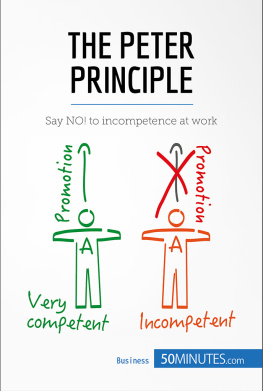CHAPTER 1
The Peter Principle
I begin to smell a rat.
M. DE C ERVANTES
W HEN I WAS a boy I was taught that the men upstairs knew what they were doing. I was told, Peter, the more you know, the further you go. So I stayed in school until I graduated from college and then went forth into the world clutching firmly these ideas and my new teaching certificate. During the first year of teaching I was upset to find that a number of teachers, school principals, supervisors and superintendents appeared to be unaware of their professional responsibilities and incompetent in executing their duties. For example, my principals main concerns were that all window shades be at the same level, that classrooms should be quiet and that no one step on or near the rose beds. The superintendents main concerns were that no minority group, no matter how fanatical, should ever be offended and that all official forms be submitted on time. The childrens education appeared farthest from the administrator mind.
At first I thought this was a special weakness of the school system in which I taught so I applied for certification in another province. I filled out the special forms, enclosed the required documents and complied willingly with all the red tape. Several weeks later, back came my application and all the documents!
No, there was nothing wrong with my credentials; the forms were correctly filled out; an official departmental stamp showed that they had been received in good order. But an accompanying letter said, The new regulations require that such forms cannot be accepted by the Department of Education unless they have been registered at the Post Office to ensure safe delivery. Will you please remail the forms to the Department, making sure to register them this time?
I began to suspect that the local school system did not have a monopoly on incompetence.
As I looked further afield, I saw that every organization contained a number of persons who could not do their jobs.
A Universal Phenomenon
Occupational incompetence is everywhere. Have you noticed it? Probably we all have noticed it.
We see indecisive politicians posing as resolute statesmen and the authoritative source who blames his misinformation on situational imponderables. Limitless are the public servants who are indolent and insolent; military commanders whose behavioral timidity belies their dreadnaught rhetoric, and governors whose innate servility prevents their actually governing. In our sophistication, we virtually shrug aside the immoral cleric, corrupt judge, incoherent attorney, author who cannot write and English teacher who cannot spell. At universities we see proclamations authored by administrators whose own office communications are hopelessly muddled; and droning lectures from inaudible or incomprehensible instructors.
Seeing incompetence at all levels of every hierarchypolitical, legal, educational and industrialI hypothesized that the cause was some inherent feature of the rules governing the placement of employees. Thus began my serious study of the ways in which employees move upward through a hierarchy, and of what happens to them after promotion.
For my scientific data hundreds of case histories were collected. Here are three typical examples.
M UNICIPAL G OVERNMENT F ILE , C ASE N O. 17 J. S. Minion was a maintenance foreman in the public works department of Excelsior City. He was a favorite of the senior officials at City Hall. They all praised his unfailing affability.
I like Minion, said the superintendent of works. He has good judgment and is always pleasant and agreeable.
This behavior was appropriate for Minions position: he was not supposed to make policy, so he had no need to disagree with his superiors.
The superintendent of works retired and Minion succeeded him. Minion continued to agree with everyone. He passed to his foreman every suggestion that came from above. The resulting conflicts in policy, and the continual changing of plans, soon demoralized the department. Complaints poured in from the Mayor and other officials, from taxpayers and from the maintenance-workers union.
Minion still says Yes to everyone, and carries messages briskly back and forth between his superiors and his subordinates. Nominally a superintendent, he actually does the work of a messenger. The maintenance department regularly exceeds its budget, yet fails to fulfill its program of work. In short, Minion, a competent foreman, became an incompetent superintendent.
S ERVICE I NDUSTRIES F ILE , C ASE N O. 3 E. Tinker was exceptionally zealous and intelligent as an apprentice at G. Reece Auto Repair Inc., and soon rose to journeyman mechanic. In this job he showed outstanding ability in diagnosing obscure faults, and endless patience in correcting them. He was promoted to foreman of the repair shop.
But here his love of things mechanical and his perfectionism become liabilities. He will undertake any job that he thinks looks interesting, no matter how busy the shop may be. Well work it in somehow, he says.
He will not let a job go until he is fully satisfied with it.
He meddles constantly. He is seldom to be found at his desk. He is usually up to his elbows in a dismantled motor and while the man who should be doing the work stands watching, other workmen sit around waiting to be assigned new tasks. As a result the shop is always overcrowded with work, always in a muddle, and delivery times are often missed.
Tinker cannot understand that the average customer cares little about perfectionhe wants his car back on time! He cannot understand that most of his men are less interested in motors than in their pay checks. So Tinker cannot get on with his customers or with his subordinates. He was a competent mechanic, but is now an incompetent foreman.
M ILITARY F ILE , C ASE N O. 8 Consider the case of the late renowned General A. Goodwin. His hearty, informal manner, his racy style of speech, his scorn for petty regulations and his undoubted personal bravery made him the idol of his men. He led them to many well-deserved victories.
When Goodwin was promoted to field marshal he had to deal, not with ordinary soldiers, but with politicians and allied generalissimos.
He would not conform to the necessary protocol. He could not turn his tongue to the conventional courtesies and flatteries. He quarreled with all the dignitaries and took to lying for days at a time, drunk and sulking, in his trailer. The conduct of the war slipped out of his hands into those of his subordinates. He had been promoted to a position that he was incompetent to fill.
An Important Clue!
In time I saw that all such cases had a common feature. The employee had been promoted from a position of competence to a position of incompetence. I saw that, sooner or later, this could happen to every employee in every hierarchy.
H YPOTHETICAL C ASE F ILE , C ASE N O. 1 Suppose you own a pill-rolling factory, Perfect Pill Incorporated. Your foreman-pill roller dies of a perforated ulcer. You need a replacement. You naturally look among your rank-and-file pill rollers.
Miss Oval, Mrs. Cylinder, Mr. Ellipse and Mr. Cube all show various degrees of incompetence. They will naturally be ineligible for promotion. You will chooseother things being equalyour most competent pill roller, Mr. Sphere, and promote him to foreman.
Now suppose Mr. Sphere proves competent as foreman. Later, when your general foreman, Legree, moves up to Works Manager, Sphere will be eligible to take his place.
If, on the other hand, Sphere is an incompetent foreman, he will get no more promotion. He has reached what I call his level of incompetence. He will stay there till the end of his career.












